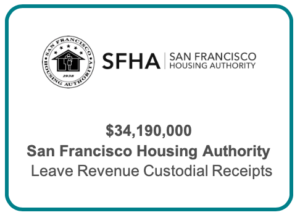


The Housing Authority of the City and County of San Francisco, California (“SFHA”) desired to access efficient financing to implement a significant energy conservation financing. Traditional industry funding sources were in flux as a result of the Great Recession.
The United States Department of Housing and Urban Development (“HUD”) spends approximately $6.4 billion in utility assistance each year. HUD established incentive programs to encourage Public Housing Authorities to take on Energy Performance Contracting (“EPC”) to help reduce these utility costs. Normally offered by Energy Service Companies (ESCOs), this innovative financing technique allows building users to achieve energy savings without upfront capital expenses. The costs of the energy improvements are financed on the front end and paid back out of the energy savings and the HUD incentives for a period up to 20 years.
On the back of several successful and similar transactions, including one for the Boston Housing Authority, Crews was hired to provide $34,190,000 in financing for SFHA. The firm repeated the same innovative process, securitizing and selling participations of an equipment-financing lease into the municipal bond market with an investment grade credit rating of “A” by Standard & Poor’s. Further, Crews utilized a bifurcated structure of traditional tax-exempt and a special federally subsidized financing program, Build America Bonds, whereby it was taxable to investors and the federal government agreed to pay 35% of the interest cost.
Further, SFHA needed flexibility for early payoff of the financing without penalty to allow for hopeful property redevelopments. Crews structured a portion of the financing to be able to be prepaid early with very little interest rate impact.
Crews worked hard to serve our client in extraordinary ways by: